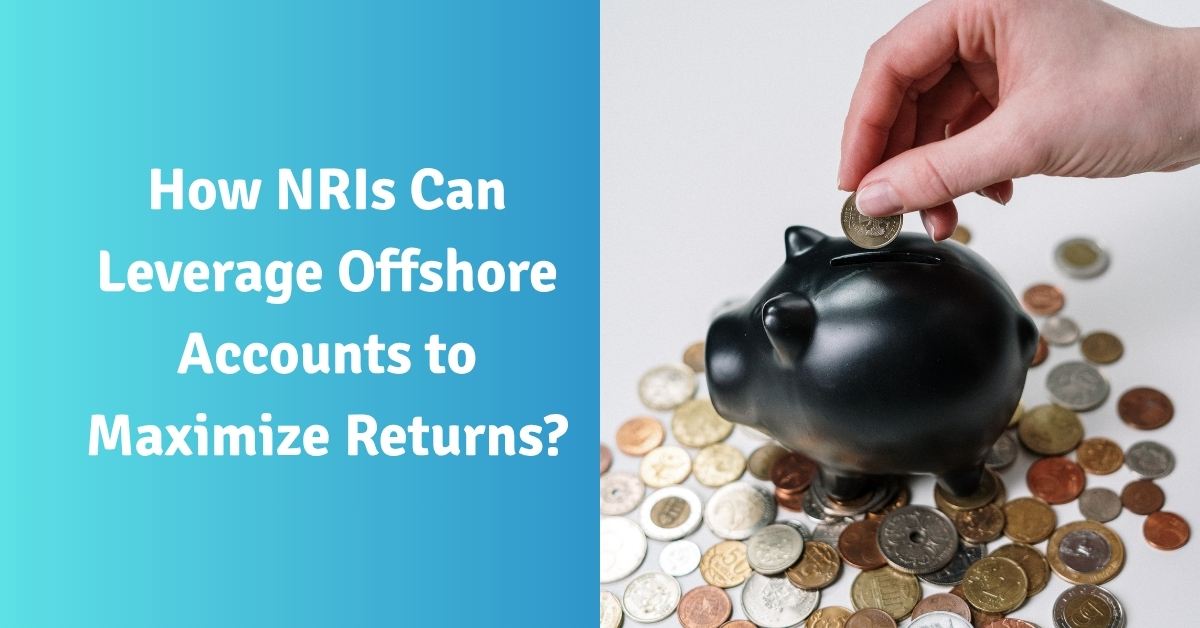How NRIs Can Leverage Offshore Accounts to Maximize Returns?

For Non-Resident Indians, who are confronted with the daunting landscape of global finance, offshore banking holds unique promise to maximize return and create wealth that endures for generations. As world residents with double loyalty to India and your country of residence, understanding how to strategically employ offshore banking can bolster your portfolio to a large extent while staying within cross-border regulatory compliance.
Understanding Offshore Banking for NRIs
Offshore accounts provide NRIs with the freedom to manage money in a host of foreign currencies and maybe take advantage of tax efficiencies that do not exist in India or even your home country. Offshore accounts are robust financial instruments that allow global diversification of assets, exposure to markets in the entire world, and protection from exchange rate risk and other asset protection benefits. Did you know that Singapore, UAE, and Mauritius continue to be the top offshore destinations for NRIs based on their strong banking systems and tax agreements with India?
Tax Optimization Strategies Through Offshore Banking
One of the greatest advantages of offshore accounts for NRIs is legal tax minimization. By investing prudently in tax-haven nations that enjoy tax treaties, you can minimize your overall tax burden while being prudent about compliance in India and your host country as well. Offshore accounts may help you outsmart the trap of Double Taxation Avoidance Agreements (DTAAs) and optimize your global money power.
Further Diversification Options for Investments
Offshore accounts expose you to investment options which may not be accessible in domestic banking systems. From foreign equity markets to exotic investment products, these accounts allow you to form a genuinely international portfolio. Offshore centers offer most of them advanced wealth management infrastructure with an orientation towards NRIs, such as exposure to high-end investments and investment products designed for overseas investors.
Asset Protection and Preservation of Wealth
In addition to maximizing return, offshore banking also presents NRIs with greater facilities for protection of assets. Political instability, currency devaluation, and economic crises can become fantastic risks to preservation of wealth. A well-crafted offshore banking plan safeguards your assets against such potential risks and provides a foundation for long-term wealth appreciation and transmission of wealth. Fun fact: The majority of offshore jurisdictions have sophisticated trust structures that can prove to be of great benefit to NRIs structuring their estates abroad.
Choosing the right Offshore Banking Jurisdiction
Not all offshore financial centers are equal, and the jurisdiction to your success is vital. Political stability, regulatory regime, banking secrecy legislation, ease of maintaining an account, and the particular tax advantages available to your case should be considered. Singapore, UAE, and Mauritius are some of those countries providing sound financial infrastructures with sound legal frameworks that are particularly attractive to NRI investors who want to ensure maximum returns while ensuring compliance.
Conclusion
Offshore accounts offer NRIs a smart way to maximize returns, reduce tax liabilities, and diversify investments globally. When used strategically, these accounts can help safeguard assets and build long-term wealth across borders. With the right financial structure, NRIs can take full advantage of international opportunities while staying compliant with all regulations. Working with a trusted financial planner for NRI is key to navigating the complexities of offshore banking and creating a personalized plan that aligns with your financial goals. Ready to unlock the true potential of your global wealth? Our expert advisors are here to help you get started.
FAQs
- What exactly is an offshore account?
Ans- An account established in a financial institution located outside your country of residence or citizenship, typically in a jurisdiction offering tax or other financial advantages. - Are offshore accounts legal for NRIs?
Ans- Yes, offshore accounts are completely legal provided you declare them as required and comply with tax reporting obligations in both India and your country of residence. - Which countries offer the best offshore banking services for NRIs?
Ans- Singapore, UAE, Hong Kong, and Mauritius are particularly popular among NRIs due to their strong financial systems and favorable tax treaties. - Do I need to report my offshore accounts to Indian authorities?
Ans- Yes, NRIs must declare foreign assets including offshore accounts on their Indian tax returns if they qualify as tax residents of India. - What’s the minimum amount needed to open an offshore account?
Ans- This varies by jurisdiction and bank, but typically ranges from $10,000 to $100,000 for premium offshore banking services. - Can offshore accounts help with retirement planning?
Ans- Yes, they can be excellent vehicles for retirement planning, offering tax-efficient growth and international investment opportunities. - How do I ensure compliance with FATCA and CRS regulations?
Ans- Work with qualified cross-border tax advisors who understand both Indian and international reporting requirements and can guide you on proper disclosure. - What types of investments can I access through offshore accounts?
Ans- International stocks, bonds, mutual funds, alternative investments, and specialized financial products not available in domestic markets. - Can offshore accounts protect against currency devaluation?
Ans- Yes, by holding multiple currencies and investments denominated in stable currencies, you can hedge against devaluation risks. - How do I choose the right offshore banking jurisdiction?
Ans- Consider factors including political stability, regulatory environment, banking infrastructure, tax treaties with India, and specific advantages relevant to your financial situation.
Disclaimer: The information provided here is for educational and informational purposes only and should not be construed as financial, legal, or tax advice. Consult with a qualified professional before making any investment decisions. We do not accept any liability for errors or omissions in this information nor any direct, indirect, or consequential losses arising from its use.



